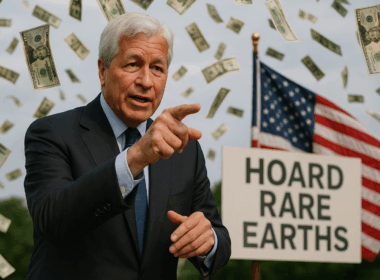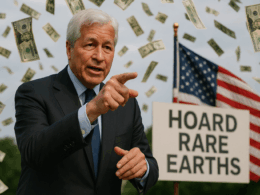
Dear Readers,
I want to start this week’s letter with an apology. There are a lot of phone calls and emails that I have yet to respond to; many questions have been asked about not just the gold market, but about many of the stocks within the sector. I hope to answer most of your questions in this letter.
Gold has been forced down to $1600 this week. As a result, it sent shockwaves into gold stocks, and in particular, the junior market. Those long on gold equities have felt the pain.
Over the last few years, my readers have made a lot of money with the insights and ideas I have shared in my Equedia Weekly Letter. The recent slump in the precious metals stocks has finally begun to really weed out the good and bad stocks; it’s doing the same with shareholders.
It’s a tough market and you should only participate if you know of the risks – especially given the over-manipulated and overly regulated markets we now face. I am not allowed to tell you when to buy or when to sell; regulations simply won’t let me. But I do expect investors to take profits. If you did last year, you should have built a nice war chest to take advantage of this most recent downfall in the precious metals market.
Many of you asked me why I haven’t added any new stocks to the Equedia Select Portfolio in the last few months – especially those who didn’t get a chance to benefit from my stock ideas last year.
The answer is simple: Many of the stocks I liked were already nearing 52-week highs.
But over the last week things have changed, with many of the stocks in the precious metals sector falling dramatically. And that gives way to new opportunities.
I have been doing a lot of research in the past few weeks on specific companies because I believe the time is coming soon to take advantage of the overly beaten stocks in the precious metals sector. It may not be tomorrow, but I will soon pull the trigger. I may not be able to tell you when to buy or when to sell, but I can tell you what I buy and when I buy it.
An Absolute Disaster
Last week, the media was obsessed with talking about how gold and silver got slammed because of strong U.S. economic numbers which spurred optimism. When things appear good, there’s no reason to own gold apparently.
But are they really good?
Retail is always a good indicator of consumer confidence and overall economic health — always has been and always will be.
If things are better, than why did the biggest retail chain in the most powerful country just have its worst monthly start since 2006?
According to internal e-mails obtained by Bloomberg News:
“In case you haven’t seen a sales report these days, February MTD sales are a total disaster,” Jerry Murray, Wal-Mart’s vice president of finance and logistics, said in a Feb. 12 e-mail to other executives, referring to month-to-date sales. “The worst start to a month I have seen in my ~7 years with the company.”
Murray wasn’t the only executive with doubts. In a separate internal e-mail obtained by Bloomberg News, Cameron Geiger, senior vice president of Wal-Mart U.S. Replenishment said:
“Have you ever had one of those weeks where your best- prepared plans weren’t good enough to accomplish everything you set out to do?” Geiger asked in a Feb. 1 e-mail to executives. “Well, we just had one of those weeks here at Wal-Mart U.S. Where are all the customers? And where’s their money?”
I guess Wal-Mart’s “total disaster” is Obama’s “much better and rapidly improving.”
As matter of fact, through Obama’s eyes, the improving economic conditions are so good that he decided to call for a 24% increase in minimum wages (that was sarcasm, by the way) and have wages anchored to inflation going forward. But wait, I thought there wasn’t any inflation? (more sarcasm…)
Bad Loans and Unemployment
On the European front, it seems that optimism has also been overblown.
A recent study by Ernst & Young has revealed that euro-land banks in the aggregate now hold 918 billion euros ($1.23 trillion) of loans that were currently not being paid back at all or could only partly be paid back.
That means 7.6 percent of all loans granted in the eurozone are bad.
Meanwhile, Greek unemployment continues to climb. Greece’s unemployment numbers are nearly double what they were in the beginning of 2010.
Recent data shows that young workers are, well, not working. The unemployment rate for those aged 15 to 24 sits at a whopping 61.7 percent. Meanwhile, the 25 to 34 age bracket sits at a staggering 36.2 percent unemployment.
Greece isn’t alone.
Unemployment is Spain for those under 25 has now soared to 55.6%; Italy 36.6%; Portugal 38.3%; Ireland 30.2%; France 27%; Luxembourg 18.8%; Cyprus 28.5%; Slovenia 26.9%.
Perhaps the retired have been forced to keep working; leaving no jobs for the youth…
I have stated many times before that this is not a market of fundamentals, but one of euphoria induced by government policies and central banks. Oh, and let’s not forget the media; 90% of everything Americans read, watch, and listen to is controlled by only 6 major corporations owned by powerful people entrenched in politics.
When it comes to investing, fundamentals never dictate the pace of the market. The market is dictated by the mass that often cannot see what’s really ahead of them. That’s why you should never bet against the power of mass conformity, but should always be prepared to take advantage of that knowledge.
Time for a Break
Prices in the current market remain artificially high and maintaining them here is going to be difficult as central banks become less effective. The market is already stalling once again this week with lower volumes supporting the market. Near-term highs may soon see a slight correction.
At some point, things will break. And the growing currency war could be the catalyst.
Currency War
On Saturday, the G20 leaders agreed that there will be no currency war and deferred plans to set new debt-cutting targets, underlining broad concern about the fragile state of the world economy.
They know that a currency war will lead to unavoidable consequences: massive inflation around the world, massive devaluation of currency, and a complete overhaul of the world’s financial system.
But can they avoid the currency war? Let me rephrase that — can they prevent the currency war from getting worse?
The Fed and other central banks continue to print, which essentially devalues their respective currencies. I won’t go into every detail of the matter, but I suggest you go back to at least a few of my past letters and get caught up to speed (see Watch the Throne.)
Most of these nations no longer have a choice. Every nation will continue to print and this will not stop unless the world somehow does a full 180 and pays back all of its debt, completely deleverages, and shows major signs of real growth. Perhaps in fairy tale land that might just happen. But this is the real world.
The currency war is unavoidable. Just because you dress a wolf in sheep’s clothing, doesn’t mean it’s a sheep.
So while the G20 nations talked of no currency war, other countries reacted differently.
Norway, Western Europe’s largest oil exporter, just added more fuel to the fire.
Governor Oeystein Olsen boldly stated, just before the G20 conference, that the Norges Bank is ready to cut interest rates further to counter krone gains that interfere with the inflation target:
“If it gets too strong over time, leading to inflation that’s too low, we will act.”
Norway’s politicians, central bankers and business leaders have already joined forces to weaken the currency.
This is a direct result of the current currency war.
The Death Cross
In the short term, gold may continue to see more pressure.
On Friday, gold fell below both the 50-day and the 200-day moving averages. This has sparked a wave of negative sentiment as gold prices appear to be getting closer to that dreaded technical death cross, which refers to the point where the 50-day average gold price dips below the 200-day average gold price.
In the word of technical trading, this is as clear a sell signal as you’re going to get.
Gold has hit a couple of death crosses since the 2008 crisis. In both cases, gold took a major slump — falling as much as 18 percent in the following months in 2008, and over 9 percent in 2012. This may seem like a major dip, but gold rebounded very strongly both times — especially after the 2008 death cross, which eventually sent gold to new highs just years later.
Be careful of gold prices in the short term. If prices dip, it will signal a better entry point, but patience here is the key as gold could be manipulated down further.
While the near-term price of gold seems dismal, the longer term outlook remains unchanged and I expect gold to go higher.
The World Gold Council showed a slight decline in demand for 2012, but that won’t stop other central banks from buying.
According to Bloomberg, Russia is not only one of the biggest oil and gas producers in the world, but it is now the biggest buyer of gold.
Vladimir Putin’s central bank has added 570 metric tons of the metal in the past decade, a quarter more than runner-up China, according to IMF data compiled by Bloomberg.
I also expect for China to continue to their gold buying in secret before announcing it to the world, as they have done before. China spent 5 years accumulating gold in secret before announcing to the world that it had doubled its official gold holdings in 2009. If 5 years is the magic number, expect China to announce their secret gold buying sometime next year. Perhaps they would have doubled it again by then. With gold prices falling, expect them to be buying.
In the meantime, gold and silver equities may continue to get slammed; those who are playing should understand that. The slump in gold market equities are creating an even bigger disconnect between the valuations of the companies and metal prices. The bigger this gap gets, the bigger the opportunity.
Don’t look at this slump as something negative. Look at it as an opportunity for positioning. Retail investors should focus on the stock play, while institutions and bankers should focus on the value of the projects.
Be patient and don’t let emotions get the best of you.
Until next week,
Ivan Lo
Equedia Weekly

Questions?
Call Us Toll Free: 1-888-EQUEDIA (378-3342)
Disclosure: I am long gold and silver through ETF’s and bullion, as well as long both major and junior gold and silver companies. Our reputation is built upon the companies we feature. That is why we invest in every company added to our Equedia Select Portfolio. It’s your money to invest and we don’t share in your profits or your losses, so please take responsibility for doing your own due diligence. Remember, past performance is not indicative of future performance. Just because many of the companies in our previous Equedia Reports have done well, doesn’t mean they all will.
Disclaimer and Disclosure
Equedia.com & Equedia Network Corporation bears no liability for losses and/or damages arising from the use of this newsletter or any third party content provided herein. Equedia.com is an online financial newsletter owned by Equedia Network Corporation. We are focused on researching small-cap and large-cap public companies. Our past performance does not guarantee future results. Information in this report has been obtained from sources considered to be reliable, but we do not guarantee that it is accurate or complete. This material is not an offer to sell or a solicitation of an offer to buy any securities or commodities.
Furthermore, to keep our reports and newsletters FREE, from time to time we may publish paid advertisements from third parties and sponsored companies. We are also compensated to perform research on specific companies and often act as consultants to many of the companies mentioned in this letter and on our website at equedia.com. We also make direct investments into many of these companies and own shares and/or options in them. Companies do pay us to advertise on our website and we often distribute our reports on featured companies. While we are never paid to write a rosy and positive report on any company, we do market our reports using the advertising fees paid for by our featured companies. This process allows us to continue publishing high-quality investment ideas at no cost to you whatsoever. Our revenue is generated by sponsor companies and we grow our readership by using the advertising fees we charge to distribute our reports. This helps both Equedia and our client companies gain exposure and allows us to provide you with our research at no cost.
Therefore, information should not be construed as unbiased. Each contract varies in duration, services performed and compensation received.
If you ever have any questions or concerns about our business or publications, we encourage you to contact us at the email or phone number below. Equedia.com is not responsible for any claims made by any of the mentioned companies or third party content providers. You should independently investigate and fully understand all risks before investing. We are not a registered broker-dealer or financial advisor. Before investing in any securities, you should consult with your financial advisor and a registered broker-dealer. The information and data in this report were obtained from sources considered reliable. Their accuracy or completeness is not guaranteed and the giving of the same is not to be deemed as an offer or solicitation on our part with respect to the sale or purchase of any securities or commodities. Any decision to purchase or sell as a result of the opinions expressed in this report OR ON Equedia.com will be the full responsibility of the person authorizing such transaction.
Please view our privacy policy and disclaimer to view our full disclosure at http://equedia.com/cms.php/terms. Our views and opinions regarding the companies within Equedia.com are our own views and are based on information that we have received, which we assumed to be reliable. We do not guarantee that any of the companies will perform as we expect, and any comparisons we have made to other companies may not be valid or come into effect. Equedia.com is paid editorial fees for its writing and the dissemination of material and the companies featured do not have to meet any specific financial criteria. The companies represented by Equedia.com are typically development-stage companies that pose a much higher risk to investors. When investing in speculative stocks of this nature, it is possible to lose your entire investment over time. Statements included in this newsletter may contain forward looking statements, including the Company’s intentions, forecasts, plans or other matters that haven’t yet occurred. Such statements involve a number of risks and uncertainties. Further information on potential factors that may affect, delay or prevent such forward looking statements from coming to fruition can be found in their specific Financial reports.
Equedia Network Corporation is also a distributor (and not a publisher) of content supplied by third parties and Subscribers. Accordingly, Equedia Network Corporation has no more editorial control over such content than does a public library, bookstore, or newsstand. Any opinions, advice, statements, services, offers, or other information or content expressed or made available by third parties, including information providers, Subscribers or any other user of the Equedia Network Corporation Network of Sites, are those of the respective author(s) or distributor(s) and not of Equedia Network Corporation. Neither Equedia Network Corporation nor any third-party provider of information guarantees the accuracy, completeness, or usefulness of any content, nor its merchantability or fitness for any particular purpose.













